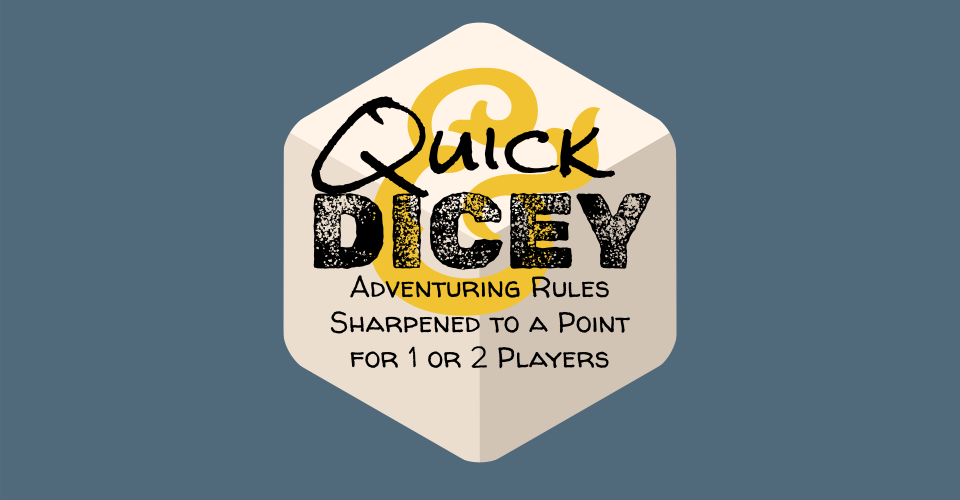Design Intent
Why did I make this game? And why might you like it, compared to other rules-light RPGs?
If, like me, you have a strong desire to play (or design!) adventures and dungeons in an old school style, but have ADHD, low social energy, a busy schedule, or not enough friends interested in it, this game is for us.
I love running interesting dungeons, and there are an ever-increasing number that are so good they make me want to run them RIGHT NOW. Q&D is made to literally pick up and play one at the drop of a hat. Make a party, give them some rumors, plop them in front of the dungeon, and you're adventuring!
It's fast to play. I've averaged 10 minutes per dungeon room/encounter while running Q&D. That's not to say that faster is better - these were dense dungeons, with plenty of interactivity, and I wasn't exactly ushering my player along - I'm a pretty slow GM. What it means is that you can cut to the meat of what you like about adventuring, and get more Quality Dungeon Time into your life! Even 1-1.5 hour sessions feel fulfilling. It might also make those huge Megadungeons seem more reasonable to take on...
Having only one player to interact with on top of GMing is much, much less mentally and socially draining for me, AND much easier to coordinate a session and flexibly fit them into a busy or dynamic schedule. Running Q&D sustains, rather than drains, my enjoyment and excitement for this style of game. So, a focus of Q&D's design is supporting a smooth conversation between the GM and a single player with simple and intuitive rules, rather than crunch that can snag and bog down the game.
I've always wanted to write and publish my own adventures and dungeons, but a big roadblock was lack of enough energy to playtest enough to ensure a good experience across a range of OSR/Old School style games. So, Q&D preserves and laser-focuses on the core aspects of those games. Combined with the low overhead and ease of play, this increases both the amount and focus of playtesting I can get done in the same time! It could also be useful to try out an adventure and get experience with the potential situations that arise, before running it for a larger group with a more involved ruleset.
Help Improve This Game!
Comment here (or send to the email in the doc) with play reports, feedback, suggestions, and answers to the following questions:
- Are there any rules with confusing wording?
- Was there any friction due to the rules that took up time or mental effort?
- Was there any dissonance in play, something you or players wanted to do that seemed like they should be supported by the rules, but wasn’t?
- Does it seem like any parts of the game go against its design intent (as stated on the itch page and devlog)?
- Any thoughts on the Guidance and Principles?
- Did you try any of the Extra Options? How did it go?
Once I receive feedback from 10 people, I will revise the rules with this input, and finalize the text so we can proceed to the next Itchfunding Goal!
Get Quick & Dicey
Quick & Dicey
Adventuring Rules Sharpened to a Point, for Two Players
| Status | In development |
| Category | Physical game |
| Author | Foolish Endeavor |
| Genre | Adventure |
| Tags | Itch Funding, OSR, rules-lite, sworddream, Tabletop role-playing game, Two Player |
More posts
- Itchfunding RoadmapAug 18, 2024

Comments
Log in with itch.io to leave a comment.
Hey David!
Was looking through the rules and it took me a reread and while I did understand most of it, there's some confusing language for the Event Die system--I recommend saying something like 'use the higher die' etc. And I think the 2/4/6 results could be worded better--I see that in the expanded event die system 1, 3 and 5 have keyed results, but in the regular one they don't and that can be confusing.
Thanks for the feedback! I'll add it to the list for the next revision.